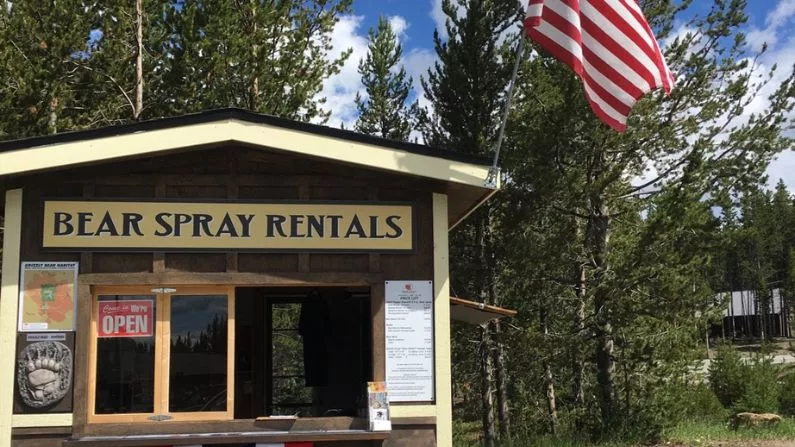It can be a love-hate relationship: 50% of the local Jackson economy is based on tourism. But last year in a survey led by the Jackson Hole Travel and Tourism Board, more than one-third of respondents expressed concerns about how the influx of visitors affects the environment.
Tori Parker, the founder of Teton Lunch Counter, said there’s a way to manage tourism without all the waste. Instead of pushing back, she said “embrace it.”
“Come up with clever and efficient ways to allow tourism to happen and function here without damaging our local communities,” Parker said.
Reducing food waste
Parker recently started providing meals for guides and outfitters that create zero waste. Her company packages meals in reusable stainless steel containers with lightweight silicone lids and sources food locally in the valley.
“Our number one economic driver is tourism,” Parker said. “And all these people are coming from all over the world to Teton County to see our wildlife and our mountains and our rivers and our streams and go fishing and enjoy what we all live here to do.”
Parker said that businesses often go to local grocery stores and buy pre-packaged sandwiches and salads. Those come in plastic containers which are not recyclable here.
Teton County doesn’t have a landfill, so all the waste is trucked out of town, mostly to Idaho.
The county has a goal of recycling or composting 60% of its waste by 2030, but the head of the county’s solid waste and recycling division said in 2021 the region is not even close to meeting that goal.
Parker said she hopes her growing business can help reverse that trend.
“We calculated that we prevented 16,000 single-use plastic containers from landing in the landfill by serving these lunches to our guides and outfitters, which is amazing,” Parker said. “This summer, we have 12 clients, and we are expected to keep about 40,000 single-use plastic containers out of the landfill, which is huge.”
And Parker isn’t alone.
Recycling bear spray
Nearly a decade ago, Patrick Collins started Teton Backcountry Rentals out of his living room in East Jackson, mostly loaning out tents and camping equipment. But, he said, it became clear that people were also looking for cans of bear spray.
The bear deterrent can be expensive to buy, but cheaper to rent. Collins said bear spray is an easy item to reuse.
“Bear spray has an expiration date on it, and it also has a weight on it,” Collins said. “And so from a simple visual inspection and weighing the can, we can tell if the can has been sprayed or not.”
So, a few seasons ago, he started a program at the Jackson Hole Airport, where people can rent the spray. Then, after their trip, they can drop it off on their way home because they can’t bring it back on the plane.
“We’re creating a financial incentive for folks, as well as an environmental incentive,” Collins. “So, if somebody can come here, rent something for roughly half the price or less than it would cost them to purchase, and then also get an education about the thing that they’re renting, they’re going to make that choice. And a bonus for that financial incentive is also helping to keep bear spray out of the landfill.”

Bear spray can help protect hikers who trek into the back country. A local business is helping make sure those cans are either reused or recycled. (Courtesy photo)
Standing in his shop north of town, Collins geared up for a busy season. He estimated that before the airport rental program started the number of discarded cans was five times what they are now.
“There’d be dozens of cans a day recycled at the airport before we started renting,” Collins said. “And then, once we started the rental program, people started getting educated about what we offered. People at the airport started spreading the word to other local businesses, and that number quickly came down. So that was the goal of the program – to reduce the amount of cans that got purchased in town and then recycled or discarded at the airport.”
Last summer, Teton Backcountry Rentals collected approximately 1,000 cans as part of airport TSA drop-offs – approximately three-quarters of which were able to be reused. The rest needed to be recycled, either because they were expired or because they had been sprayed.
The company also works with as a concessioner with the National Park Service and has drop off locations in Yellowstone.
Collins added, “Now, it is almost a no brainer to rent bear spray instead of buy it.”
Making an impact
Little steps to combat waste may be making an impact in Jackson Hole. Recent local data show the total amount of landfill waste went down in 2022, after several years of upward spikes.
But the region continues to face other issues with trash, largely around construction and demolition waste. Local officials say they are working to address it.
Still, Tori Parker with Teton Lunch Counter said small actions can still add up.
“It’s not like we have to do all of the right things all of the time, but a little bit of right every day is a step in the right direction,” Parker said. “And making these conscious decisions when consuming can really help all of us reduce our waste.”
The area’s travel and tourism board also recently created its first sustainable destination management plan with goals around reducing the environmental impacts of tourism.
Going into its first summer season with the plan in place, the community has hopes these efforts can help keep Jackson less wasteful and more wild.





